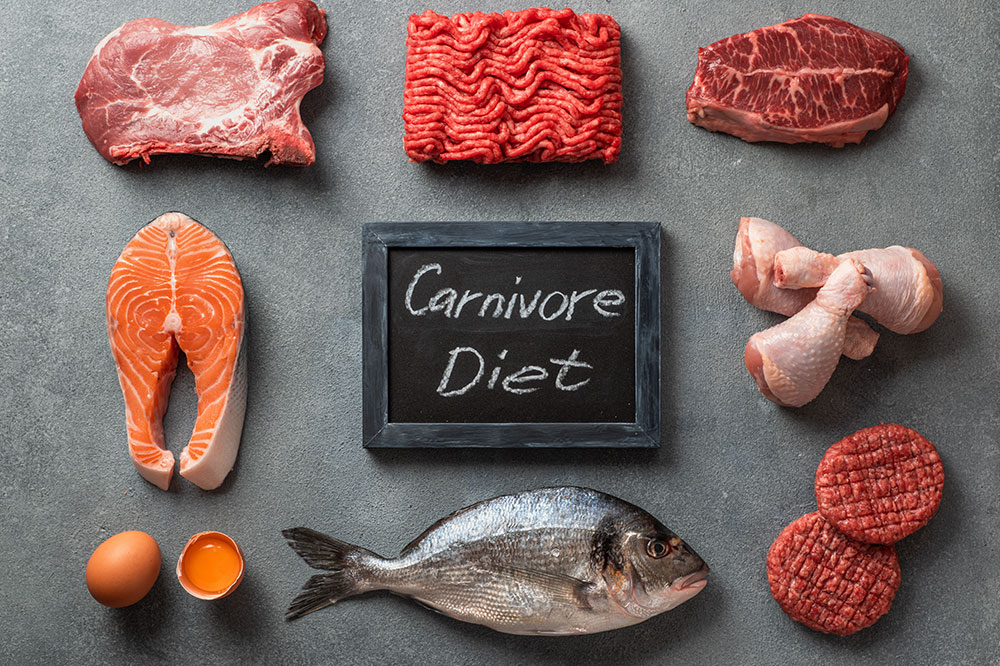Carnivore Diet – Health Benefits and Foods to Eat
A high-protein carnivore meal plan has gained significant attention in recent years amidst conflicting opinions among experts regarding its health benefits. This type of restrictive nutritional plan places a special emphasis on eating animal-based foods while completely excluding plant-based products. Keep reading to learn more about the carnivore meal plan, its health benefits, and the list of nutrient-dense food items one can eat while following this type of nutritional regime.
Foods to eat while leading a carnivore diet
As mentioned earlier, this type of diet is entirely meat-based. People following this diet must completely exclude plant-based foods and opt for alternatives like beef, pork, poultry, and seafood.

Red and organ meat
Red meat like ground beef, steaks, pork, and lamb are top choices while following the carnivore meal plan. It is advised to choose grass-fed or pasture-raised sources of red meat rather than processed red meat. Similarly, organ meat like liver, bone broth, lard, or bone marrow are also excellent options due to their high nutrient value.
Poultry
Poultry, including chicken and turkey, is another excellent protein source. One can opt for roasted or grilled chicken breasts, thighs, and whole birds to diversify one’s nutrient intake.
Seafood
Eating fish such as salmon, sardines, lobster, mackerel, and crab can be beneficial in maintaining a healthy heart. Shellfish, including shrimp, scallops, and oysters, are also excellent sources of essential nutrients like zinc and selenium.
Eggs
Eggs are another wholesome food choice that offers protein, healthy fats, and a variety of vitamins and minerals. They can be cooked in several different ways, like scrambled, fried, or boiled, and usually get done in minutes, making them an ideal choice for people with busy schedules.
Dairy products
This nutritional regime may incorporate small quantities of dairy products like cheese, butter, and heavy cream since these options provide healthy fats and calcium.
Benefits of the carnivore diet
Experts usually recommend a balanced intake of various food groups to gain maximum benefit, which includes a mix of plant-based and animal-based foods. A carnivore meal plan may not suit everyone, but many have reportedly benefitted from it. How a person’s body tolerates, adjusts, and reacts to this diet can vary. In general, this diet works best for short-term goals and provides the following benefits-
Rich in protein
Protein is essential to build one’s muscles and repair one’s tissues, and also to boost immunity, and supply energy. Animal-based food products are known to be an excellent source of high-quality protein, which makes it easier for the people following this meal plan to meet their daily protein requirements.
Lower blood sugar
Most store-bought items contain natural or added sugar that can spike one’s glucose levels, including unsuspecting foods like tomato or barbecue sauce, low-fat yogurt, or some fruits or starchy vegetables. Switching to a carnivore diet might help individuals reduce their sugar intake to a large extent, even out blood sugar levels, and maintain stable energy levels throughout the day.
Avoid food sensitivities
For individuals with specific food sensitivities or intolerances, the carnivore diet may eliminate problematic plant-based foods while still obtaining necessary nutrients.
Simplicity
A carnivore meal plan may be ideal for people who have less time to cook food due to busy schedules. This nutritional regime reduces the need to sort through many food alternatives and can make grocery shopping and meal preparation easier.
High in essential nutrients
Not only proteins but meat, fish, and eggs are also rich in essential nutrients. These foods naturally have high levels of omega-3 fatty acids, zinc, iron, and vitamin B-12, essential for boosting immune function, brain health, and the production of red blood cells.
Reduced inflammation
Sugar, processed foods, and nightshade vegetables like tomatoes, potatoes, eggplant, and peppers lead to inflammation. Removing these carbohydrate-rich foods from one’s daily meal plan can help reduce inflammation and stabilize the body’s insulin response. The carnivore diet mainly focuses on nutrient-dense animal products and eliminates processed foods. It also helps one to feel full for a longer time, thus reducing calorie intake. It may, in turn, lead to the loss of unnecessary body mass in some individuals. But it’s important to note that one should avoid processed meat which can reverse these benefits.
Decrease in autoimmune symptoms
Some people with autoimmune conditions, such as psoriasis or psoriatic arthritis, find relief from common symptoms by eliminating certain plant-based foods, which can potentially trigger flare-ups. Some individuals experienced improved energy levels and less joint pain or inflammation.
Digestive issues
Certain plant-based foods include fiber which can lead to bloating or gas. So certain individuals with digestive disorders like IBS (irritable bowel syndrome) may benefit from reduced fiber intake and the exclusion of potentially problematic plant compounds. However, one must remember that sudden nutritional changes may lead to digestive problems since the gut takes time to adjust to the new type of food.
While this meal plan may provide ample health benefits, it is advised to consult a healthcare professional before making significant changes to food habits. A nutritionist considers all aspects of one’s health needs and goals before suggesting a well-rounded and balanced diet. It can lead to a smooth transition and avoid potential nutritional deficiencies.

